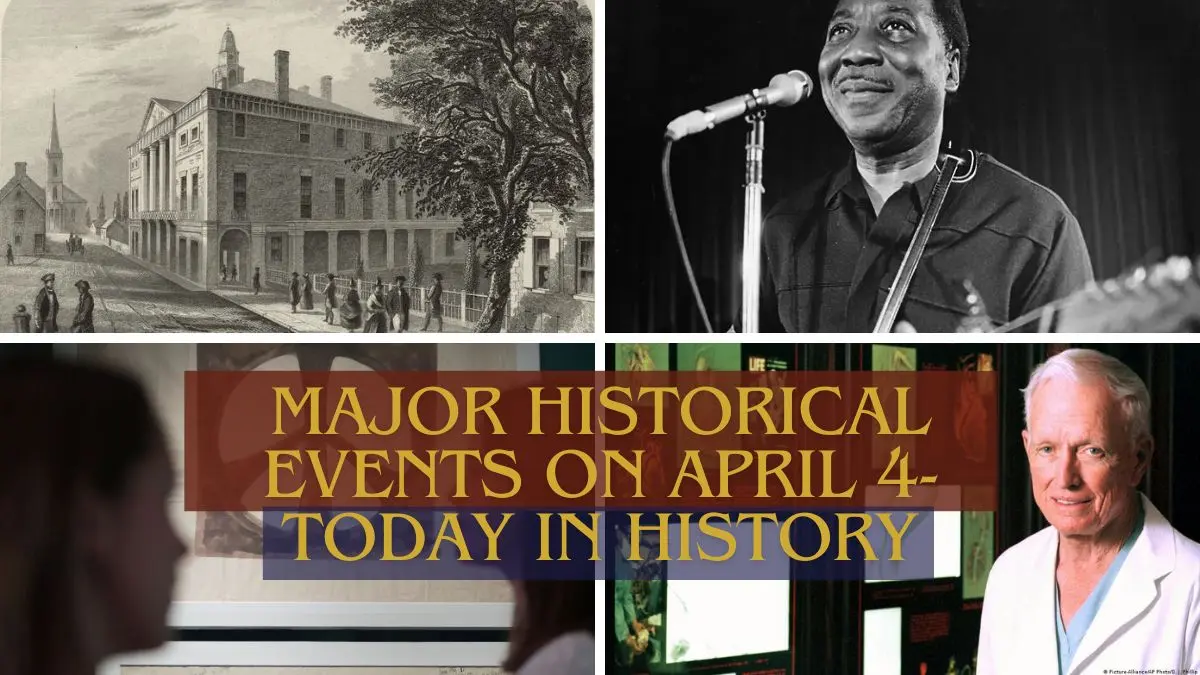4th of April offers a reflection on the myriad ways our world has been molded by both triumphs and tragedies. From the solemn remembrance of leaders who dreamed of equality and peace, to the celebration of human ingenuity and architectural marvels, April 4 encapsulates the dual nature of our collective journey through time. This article “Major Historical Events on April 4” provides a concise overview of the moments that have made April 4 significant through the ages.
Major Historical Events on April 4- Today in History
The Literary Legacy of Bettina von Arnim – 1785 AD
Bettina von Arnim emerges as a luminary in modern German literature, with her birth tracing back to Frankfurt am Main. Her contributions have cemented her status as one of the most significant female figures in the literary domain.
The Inaugural Session of the U.S. Congress – 1789 AD
In 1789, under the presidency of George Washington, the first U.S. Congress convened for its regular sessions at Federal Hall in New York City. This historic gathering marked the beginning of a foundational period in American governance, with the sessions continuing until 1791.

The Brief Presidency of William Henry Harrison – 1841 AD
William Henry Harrison’s presidency, lasting merely a month, marks him as the first U.S. president to die in office. His untimely demise led to John Tyler ascending from the vice presidency to the presidency.
Los Angeles: The Birth of an American City – 1850 AD
Incorporated with a modest population of approximately 1,600, Los Angeles embarked on its journey as an American city, setting the stage for its eventual growth into a global metropolis.
The Peninsular Campaign: A Strategic Attempt – 1862 AD
Under the leadership of General George B. McClellan, Union forces initiated the Peninsular Campaign during the American Civil War. This endeavor aimed to seize the Confederate capital, Richmond, Virginia, yet fell short of its goals.
Muddy Waters: Shaping the Blues – 1913 AD
Muddy Waters stands as a pivotal figure in the evolution of the blues genre, significantly influencing the development of modern rhythm-and-blues through his exceptional skills as a guitarist and singer.

Marguerite Duras: A Literary and Cinematic Icon – 1914 AD
Marguerite Duras, born in Cochinchina (Vietnam) and later passing in Paris, France, was a formidable French novelist, screenwriter, and director known globally for her works, including the screenplay for “Hiroshima mon amour” and the novel “The Lover,” which won the esteemed Prix Goncourt.
Maya Angelou: Voice of Resilience – 1928 AD
Maya Angelou is celebrated for her autobiographical works that deeply explore themes of economic, racial, and sexual oppression, earning her a distinguished place in American literature.
NATO: A United Defense Front – 1949 AD
The establishment of the North Atlantic Treaty Organization brought together Belgium, Canada, Denmark, France, Iceland, Italy, Luxembourg, the Netherlands, Norway, Portugal, the United Kingdom, and the United States in a military alliance aimed at collective defense.
The Dawn of the Peace Symbol – 1958 AD
Gerald Holtom’s creation, the peace symbol, debuted to the public eye during a protest by the British Campaign for Nuclear Disarmament, quickly becoming an emblem of peace movements worldwide.

The Mali Federation: A Brief Union – 1959 AD
The Mali Federation emerged in West Africa as a fleeting alliance between the Sudanese Republic and Senegal, with Léopold Senghor at the helm, marking a notable, though short-lived, chapter in African political history.
Ben-Hur: A Cinematic Triumph – 1960 AD
“Ben-Hur” set a precedent in film history by clinching 11 Academy Awards, including best picture, director for William Wyler, and lead actor for Charlton Heston, becoming an iconic biblical epic.
The Assassination of Martin Luther King, Jr. – 1968 AD
On this day in 1968, Martin Luther King, Jr., a seminal figure in the American civil rights movement, was assassinated by James Earl Ray while in Memphis, Tennessee, to support a sanitation workers’ strike.
Pioneering Heart Surgery by Denton Cooley – 1969 AD
American surgeon Denton Cooley performed the groundbreaking implantation of the first complete artificial heart in a human, a monumental step in medical history despite the patient’s eventual demise.

The World Trade Center: A Symbol of Architectural Ambition and Tragedy – 1973 AD
The World Trade Center, once heralded as the pinnacle of architectural ambition with its 110 Stories, opened its doors in New York, claiming the title of the world’s tallest building. This iconic structure, however, would later become a symbol of loss and remembrance following its destruction in the terrorist attacks of September 11, 2001.
The Genesis of Microsoft – 1975 AD
Bill Gates and Paul Allen laid the foundation for Microsoft, propelling it to become the foremost giant in the personal-computer software industry.
South Korea’s Battle Against Foot-and-Mouth Disease – 2000 AD
In a decisive move, the South Korean government shuttered a vast majority of the nation’s livestock markets to curb an outbreak of foot-and-mouth disease, affecting livestock across Asia.
Ceasefire in Angola: Ending Decades of Conflict – 2002 AD
The Angolan government and UNITA reached a ceasefire agreement after 27 years of conflict, bringing to a close a prolonged civil war and ushering in a period of peace.

Roger Ebert: A Titan of Film Criticism – 2013 AD
Roger Ebert, celebrated for his insightful film criticism and the first to be honored with a Pulitzer Prize in this category, passed away at 70, leaving behind a legacy of profound influence on cinema.
Historical Legal Challenge: Donald Trump’s Arraignment – 2023 AD
Former U.S. President Donald Trump faced arraignment in Manhattan on 34 felony charges linked to an alleged scheme to suppress a sex scandal, marking him as the first former president to confront criminal charges in U.S. history.
Also Read: Major Historical Events on April 3- Today in History



